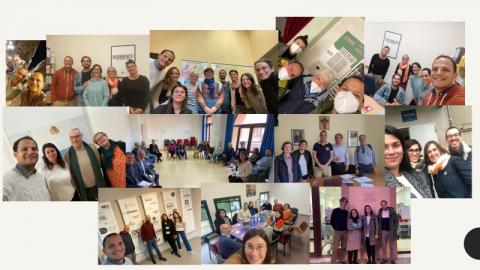Regenerative Innovation
Regenerative Innovation is a research field that combines innovation management with the generation of social value. Within this field, at the Institute of Management, research, training, and third mission activities are carried out on the following topics: (1) Impact, understood as the social and economic impact of companies and non-profit organizations, (2) Purpose-driven organizations, referring to the study of organizations guided by a purpose aimed at generating the common good, (3) People, referring to the role of individuals in regenerative innovation and their holistic development within organizations, and (4) Communities, referring to the analysis of local communities and their socio-economic development, including their ability to combat poverty and social exclusion.
Who We Are
We are a group of faculty members and young researchers who work on the theme of Regenerative Innovation at the Institute of Management, not only publishing scientific papers but also striving to have a positive impact on various types of organizations, including businesses and hybrid organizations.
What We Do
We work with companies, public organizations, and third-sector entities to co-design generative innovation solutions that can create a positive impact on people and communities. We do this by bridging the gap between scientific research and managerial practice, making available to collaborating organizations the most relevant tools emerging from the scientific literature in this research field and guiding them in the adoption of these tools.
Why We Do It
We strongly believe that much is changing, and can continue to change, in different socio-economic contexts toward more equitable, inclusive, and sustainable growth processes. Innovation plays a very important role in this process, as purpose-driven organizations use it to find effective solutions to the complex problems that affect contemporary society. We recognize the importance of adopting an innovative approach in every sector—from technology to culture, from the environment to the economy—with the goal of ensuring a better future for future generations.
We believe that innovation should be accompanied at the local level with training and consultancy activities, supporting businesses, public organizations, and third-sector entities.
Areas of Activity
- Impact: The regenerative innovation area "Impact" focuses on representing and evaluating the effects of human activities on communities, society, and the surrounding environment. The analysis focuses on the impact of various activities, such as public policies, business practices, new technologies, community initiatives, and regulations, on social well-being, equality, social justice, and other sustainable development goals. In general, the main objective of this area is to develop generative innovation solutions to address social, environmental, and economic challenges. Activities in this area include scientific production and projects on: Social impact assessment; Creation of qualitative-quantitative impact models; Strategies for high social impact actions; Training on social impact: meaning, planning, and evaluation methodologies; Training on impact reports: current Italian and European regulations for the drafting of social impact reports.
- Purpose-Driven Organizations: The regenerative innovation area "Purpose-Driven Organizations" studies and implements strategies for businesses and organizations based on a generative purpose that focuses on the common good, different from the traditional business vision focused solely on profit. In this context, profit is no longer considered the ultimate goal of the business but rather the outcome of pursuing a pro-social purpose. The main objective of this area is to promote the proliferation of purpose-driven organizations capable of generating sustainable value in the long term. Activities in this area include scientific production and projects on: Training on purpose: nature, definition, and implementation; Training on hybrid organizations and purpose; Strategies for becoming purpose-driven companies; Purpose measurement.
- People: The regenerative innovation area "People" studies strategies that place individuals and their holistic development at the center of organizations, with a particular focus on eliminating discrimination, social inequalities, and gender differences. The main objective is to enhance individuals and their full development through the sharing of values and visions of a regenerative society. Activities include scientific production and projects on: Strategic plans for Gender Equality; Strategies for the holistic human development of organizations; Diversity & Inclusion strategies and support for ISO 30415 certification; Training on social sustainability compliance.
- Communities: The regenerative innovation area "Communities" studies and implements innovative strategies for the development of communities and territories, focusing on the importance of preserving artistic, cultural, natural heritage, and the community itself. The main objective of this area is to foster the construction of processes and networks of people that promote community resilience. Activities in this area include scientific production and projects on: Socio-economic analysis of regenerative intervention territories and areas; Strategies for businesses and organizations aimed at regenerating local communities and territories by combating social inequalities and poverty; Impact evaluation of territorial projects; Networking between non-profit and for-profit territorial organizations.
Examples of Projects, Collaborations, and Initiatives
- Caritas Italiana: Report on the social impact of welcoming and assisting the population coming from Ukraine.
- Caritas Italiana: Methodological report on the social impact evaluation of Caritas projects funded by the 8x1000 scheme.
- Fondazione Pisa: Report on economic and social hardship in the Pisa area.

